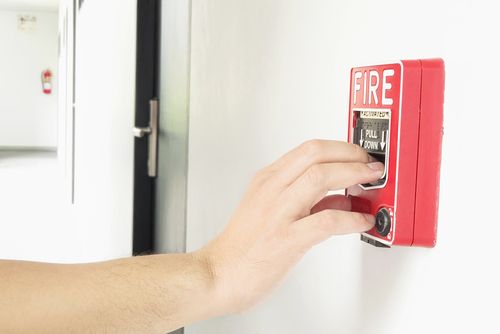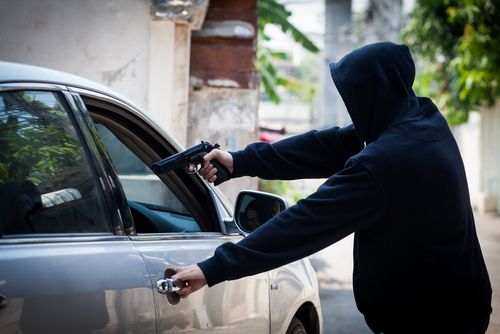The necessity defense is based on an honest and reasonable belief that you had no choice but to commit a certain crime in order to prevent greater harm.
The defense is required to prove six (6) elements to be successful.
In This Guide We'll Cover:
1.) The 6 Elements Of The Necessity Defense
1.1) You Were Preventing Significant Bodily Harm or Evil
1.2) There Was No Adequate Legal Alternative To Your Act
1.3) You Did Not Create an Even Greater Damage Or Harm.
1.4) You Had An Actual Belief That Your Act Was Necessary To Prevent The Threatened Harm Or Evil
1.5) A Reasonable Person Would Have Believed Your Act Was Necessary
1.6) You Had Not Created Or Substantially Contributed To The Emergency That Necessitated Your Act
The necessity defense that you were justified in committing a crime cannot be used to exonerate you unless all six elements of the defense have been satisfied.

Elements of the Necessity Defense Include The Following:
- You were preventing significant bodily harm or an evil
- You had no adequate legal alternative to committing your act
- The act did not create an even greater danger or more damage than the one avoided
- You possessed an actual belief that your act was necessary to prevent the threatened harm or evil
- A reasonable person would also have believed that your act was necessary under the circumstances
- You had not created or substantially contributed to the emergency that necessitated your a
An important aspect of the defense is that each element must be proved by the defendant using the civil standard of preponderance of the evidence, or that it is more likely than not that each of the 6 elements has been proved.
1.1) What Is An Example Of Preventing Significant Bodily Harm or Evil?
At the time you committed the act, there must have been an emergency situation such as where someone’s life was in peril or at risk of imminent and substantial bodily harm, or that some significant damage would result unless you committed lesser harm or act to prevent it.

What Types of Emergencies Are Allowed Under This Defense?
The emergency situation underlying or justifying your act must have been unforeseen and imminent and required that you take immediate action.

This does not generally include an economic emergency or one where you are suffering psychological harm. However, there is a case where the court allowed a homeless individual to use the necessity defense when charged with violating an ordinance prohibiting sleeping in a state park. The court opined that lack of sleep was a significant enough evil to be averted and that he lacked a legal alternative due to his economic circumstances1.
1.2) What is Considered No Adequate Legal Alternative to Your Act?
If you felt you had no choice but to commit the act, then you have to show that there was no other legal alternative available to you, such as calling the police.
What Is An Example?
An example is a defendant who was being forced by gang members to rob a bank or liquor store.

If a gang member accompanied the defendant into the place to be robbed, then the defendant had no opportunity to call the police, so this element would likely be satisfied.
However, if the gang members wait outside or in a getaway vehicle, the defendant had an opportunity to alert the robbery victim to call the police. It makes no difference if the defendant argues that he was so intimidated by the gang that he had to commit the act.
Are There Other Options Beside Calling The Police?
Calling the police is just one legal alternative.
Taking steps other than committing a criminal act, no matter how innocuous it may be so as to remove the potential harm or danger is another.
For instance, your wife or girlfriend may have sustained a severe injury or was in emergency labor. You rush her to the hospital in your car, running stop signs and lights before you cause an accident or are stopped by the police.

In this case, your alternative was to call 911.
You might be able to argue otherwise if you had called 911 a number of times and no one responded, or no phone was available, or there were no persons around who could have called for you.
1.3) Your Act Did Not Create an Even Greater Damage or Harm
Even if the emergency required immediate action on your part, your act cannot produce or lead to damage or a situation that is worse than the one being averted.
For instance, if a person was in dire need of a rare antidote to save him from death, you might use the defense to justify your burglarizing a facility at night when no one was present to obtain it.

However, if a security guard stops you and denies you entry to the building, you are not justified in fatally assaulting the guard.
1.4) You Had an Actual Belief That Your Act Was Necessary To Prevent The Threatened Harm or Evil
If you had an honest belief that your act was necessary to prevent even greater harm or disaster, then you may satisfy this element of the defense.
In many instances, there are reasonable and legal alternatives to committing a crime.
But if you were unaware of this alternative, then you might satisfy this element as well.
Example
You are in a car accident where the steering system failed and the car crashes into a tree, severely injuring your passenger who is losing blood and will die unless he gets immediate attention.
Both of your cell phones are damaged and not operable.
Unknown to you, there is a 7-11 a few hundred yards away.
You see a car approaching and wave the motorist down, but the driver refuses to help and says he has no phone and is going home.
You pull the driver out of the car and drive to town a few miles away, where you find a store and get someone to call 911.
Your act in stealing the car may be justified in preventing the death of your passenger. Although the 7-11 was only minutes away by foot, you honestly believed you had no alternative but to commit the act in order to save the life of your passenger.
1.5) Reasonable Person Would Have Believed Your Act Was Necessary
Your honest belief that you had no legal alternative or that you were preventing a greater harm or evil must be reasonable to an ordinary person.
1.6) You Had Not Created Or Substantially Contributed To The Emergency That Necessitated Your Act
If you created or substantially contributed to the situation that led to the emergency, then the necessity defense will fail.
Real Case Example
A defendant had one of his friends drive because he was intoxicated. However, his friend was also intoxicated as well and fell asleep at the wheel. The defendant took over and caused a fatal accident.

The court would not allow the jury to be instructed on the necessity defense because the defendant had created the emergency by having allowed only intoxicated passengers into his car2.
While it may have been necessary to drive if no legal alternative existed (no cab, bus, ride-share), the defendant contributed to the “atmosphere of necessity.”
The difference between the necessity and duress defenses is that in a necessity defense you intended to commit the crime but only to prevent greater harm or evil from occurring.
For the duress defense, you lacked criminal intent since you were under duress.
The duress defense has 3 elements:
- You were threatened or menaced by someone
- Someone demanded that you carry out the crime or the threatened harm would be carried out
- And, you had an honest and reasonable belief that your or someone else’s life would be in immediate jeopardy if you failed to carry out the crime
For the duress defense to apply, the harm threatened must have been immediate if you failed to carry it out. If not, then you may have had time to alert the authorities.
In 1996, California voters passed a resolution that allowed certain persons to use marijuana for medical purposes without criminal penalty, known as the “Compassionate Use Act” ((Cal. Health and Safety Code § 11362.5(b)(1).)) The law was buttressed by the Medical Marijuana Program Act in 2004. This law created an identification card for qualified users to display to police, and promoted a uniform application of the law.
In 2018, though, the voters passed Prop 64, legalizing recreational use of marijuana for those 21 and over. Under the law, any adult may cultivate up to 6 mature or 12 immature plants for his/her own use. The plants must be grown in a secure indoor or outdoor location, and cultivation is subject to local ordinances that may restrict or even prohibit it.
However, if you are a medical marijuana patient who has been prescribed the drug, then you may be able to cultivate more plants if you have a doctor’s recommendation and the number of plants you are growing is consistent with your reasonable needs under HS 11358 ((HS 11358)).
If you happen to cultivate more plants than the law permits and without a doctor’s written recommendation, you could be in violation of HS 11358. This is generally a misdemeanor if you cultivate more than 6 plants for recreational use. If convicted, you face:
- Up to 6-months in county jail
- And/or a fine up to $500
A violation may be charged as a felony if you fit within any of these categories:
- Registered sex offender
- Have a history of serious or violent felony convictions
- Have at least 2 prior convictions for violating HS 11358 (cultivated more than 6 plants)
- You are in violation of particular environmental laws during cultivation
If convicted, you face:
- 16-months, 2 or 3 years in county jail
- A fine up to $10,000
However, if you were arrested for cultivating an excessive number of plants for recreational use only and you have no more than one prior, non-violent offense for violating this HS 11358, you may be eligible for deferred entry of judgment (DEJ) under Penal Code 1000. If eligible, you would enter a guilty plea, but sentencing is deferred for 18 to 36-months for you to receive drug treatment. If completed with no other offenses, your case will be dismissed.
As a medical marijuana user, you are given wide latitude in the number of plants you are permitted to cultivate, so long as you have a medical doctor’s recommendation.
But can you use medical necessity as a defense if you did not obtain a medical recommendation and are charged with cultivating more than 6 plants or more than what is considered reasonable based on your medical recommendation?
Example
If you can show that you somehow needed to grow more plants than what might be deemed necessary or reasonable for your medical condition because of soil or other environmental conditions that made cultivation difficult, then you might be able to assert a defense under the Compassionate Use Act or Medical Marijuana Program Act. To utilize the defense under any of these laws, you have the burden of raising reasonable doubt that your conduct was unlawful3. This would include evidence that your use was recommended by a physician or that the amount you possessed or cultivated was reasonably related to your medical needs. Also, you need not show that you had a “medical necessity” for the drug in order to use the defense of Compassionate Use.4.
In some cases, inmates have successfully used the necessity defense in committing a crime to save themselves from great bodily harm or death but only under the limited circumstance of escaping from prison.
To be successful, the inmate must demonstrate the following:
- He faced an imminent threat of death, sexual assault, or substantial injury
- He had no time to either warn prison staff (guards) or there was a history of inaction or indifference by the staff to such threats
- There was no time to get assistance or relief from the court
- The inmate did not use violence on any prison staff or worker or innocent third party while escaping5.
- And, the inmate turned himself in at the earliest opportunity once he was safe from the threat
This is a rare circumstance since prison escapes are rare and difficult to engineer without assistance from a third party. An inmate also might have had the legal alternative of alerting his attorney or a family member to his plight that would render the defense inapplicable.
If you have been arrested and would like to learn more about how attorneys charge.
If you want to understand why its important to have an attorney represent you.
If you would like to discuss a pending case that might include a necessity defense with an attorney contact the Aizman Law Firm at 818-960-6197 for a free confidential consultation.
Request A Free Consultation 818-960-6197
- In re Eichorn (1998) 69 Cal.App.4th 382, 389-391 [↩]
- People v. Verlinde (2002) 100 Cal.App.4th 1146, 1165 [↩]
- People v. Mower (2002) 28 Cal.4th 457, 470; People v. Jones (2003) 112 Cal.App.4th 341, 350 [↩]
- People v. Tilekooh (2003) 113 Cal. App.4th 1433,1441 [↩]
- People v. McKinney (1986) 187 Cal. App.3d 583, 587 [↩]

